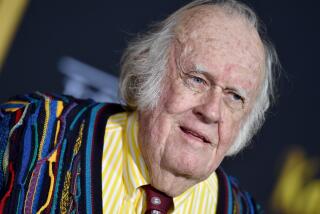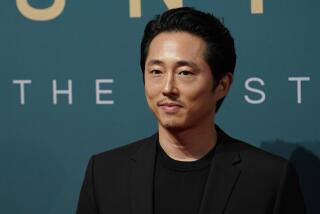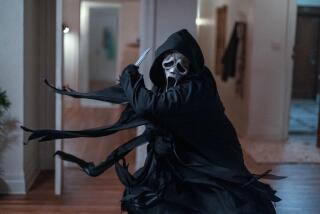How Paul Walker nearly quit the ‘Furious’ franchise
There are lots of things Paul Walker will be remembered for: His daredevil spirit. That Cheshire cat grin. A California bro ease.
But it’s his work in the “Fast and Furious” franchise that Walker will most be associated with on the screen. Over the weekend, scores of fans bid their own farewell to the actor in “Furious 7,” watching him for the last time as Brian O’Conner, the family man who also fights international villains as part of a street racing crew.
But Walker’s history with the franchise is a complicated one. The actor nearly quit the series -- and Hollywood altogether -- numerous times during the 12 years he worked on the “Furious” films.
He recounted his origin story with the franchise during a phone conversation we had in 2011. It was the only time we ever spoke. (I was supposed to meet him just a week after he died to talk about an independent film he’d done called “Hours” -- a non-meeting I’m not sure I’ll never stop thinking about.) At the time, “Fast Five” had just been released and had done far better than anyone expected, putting the series back on track at the box office.
His journey with “Furious” began in 2000, shortly after he’d finished filming “The Skulls,” a thriller about a corrupt college fraternity that maybe 10 of you saw, with Universal Pictures. The movie’s director, Rob Cohen, and producer, Neal Moritz, asked Walker what he wanted to do next. He said his dream project would be a mash-up of “Days of Thunder” and “Donnie Brasco” -- something in which he could be both an undercover cop and a race car driver. So the filmmakers brought him a Vibe article they’d found about undercover street racing in L.A.
“They said, ‘You’ll be racing as an undercover cop in this world,’” Walker recalled during our telephone conversation. “I wanted to sign on immediately and they were freaking out. If I had the same opportunity today, I’d overthink it and probably squander it. But I was younger and impressionable and I wanted to work. They came at me and I was 24 years old. I had just recently had a child out of wedlock. I wanted to have fun and I needed to put a roof over my baby’s head. Getting to hang out with my friends and support my baby seemed like a ridiculous scenario.”
But the actor said Cohen (who would direct “The Fast and the Furious”) and Moritz (who has produced all seven movies in the franchise) knew he “was apprehensive about being ‘the guy.’” So, he said, the filmmakers assured him they’d find a strong supporting costar to take away “some of the pressure and insecurity of, ‘Oh, I’m supposed to be cool in this.’”
Enter Vin Diesel. Diesel had a burgeoning acting career courtesy of the science-fiction actioner “Pitch Black,” and the filmmakers thought the pairing would be a good one. They were right. “The Fast and the Furious” was a huge hit, grossing more than $200 million worldwide in 2001 dollars.
Walker said the studio immediately approached him about making a sequel, and that he met with director John Singleton, who’d been brought in to helm the second film, and Tyrese Gibson at a W Hotel in Los Angeles. He said he liked them and liked the idea of filming in Miami. But there was trouble making Diesel’s deal, and the actor opted not to star in “2 Fast 2 Furious.”
Then, with the third film, “The Fast and the Furious: Tokyo Drift,” “there was politics, studio stuff, a regime decision,” Walker said. He and Diesel made a cameo in the movie but had effectively dropped out of the series.
So when they were asked to rejoin the franchise for its fourth installment? “I thought it was stale,” Walker said. “They were talking about my involvement with the fourth one and I was like, ‘Are you kidding me? Really?’ Obviously, we made the first one that catered to pop culture and a youth-driven audience. But trends shift overnight with that audience. Nine years later, I really questioned if there was even an audience anymore.”
Moritz couldn’t convince him to come back, he said, so Diesel gave him a call. This would be the first true sequel, Diesel assured his friend. They’d come in, knock this out and be done with the franchise.
“So I thought: ‘Why not?’” Walker said.
Walker would have some more reservations. His daughter, Meadow, had just moved from Hawaii -- where she was living with her mother -- to California to be with Walker, and he wanted to concentrate on fatherhood as well as other pursuits, such as working with wildlife and running his charity. But he eventually signed on -- in part, he said, because of the opportunities it granted him to push himself physically.
He said he also related to the fans who came up to him and told him “because of you, I wasted all that money on that Civic in 2001.” He was that guy too.
“The franchise raises questions about ‘What is the car?’” he said. “Really, it’s today’s horse -- it’s the white horse, and it symbolizes a lot for guys. It’s a rite of passage. I’m a ride. I’m a man. I can provide for myself and put gas in the car.”
It was, tragically, also what caused his death: a Porsche Carrera GT 5 -- a car known for its phenomenal speed. One he couldn’t wait to go for a ride in.
Walker has been gone for more than a year now, but almost any time I think about his death I feel like crying. “Furious 7” provided an outlet for those emotions. The movie theater was the only place where it somehow felt OK to sob over a movie star most of us never met.
While he was ambivalent about the franchise at times, the “Furious” movies ultimately held a lot of meaning to Walker too.
“The franchise has allowed me the freedom to grow at my own pace,” he said in our chat. “My priority is being the best dad I can be and the most well-rounded person I can be. This franchise granted me the opportunity to sit back and collect myself and learn a better-balanced life.”
Follow @AmyKinLA for Hollywood news and celebrity profiles
MORE FROM ENTERTAINMENT:
DirecTV ends ad campaign with Rob Lowe
‘Fresh Off the Boat’ writer Eddie Huang slams ABC comedy hit
‘Furious 7’: ‘See You Again’ songwriter inspired by a different loss
More to Read
Only good movies
Get the Indie Focus newsletter, Mark Olsen's weekly guide to the world of cinema.
You may occasionally receive promotional content from the Los Angeles Times.







